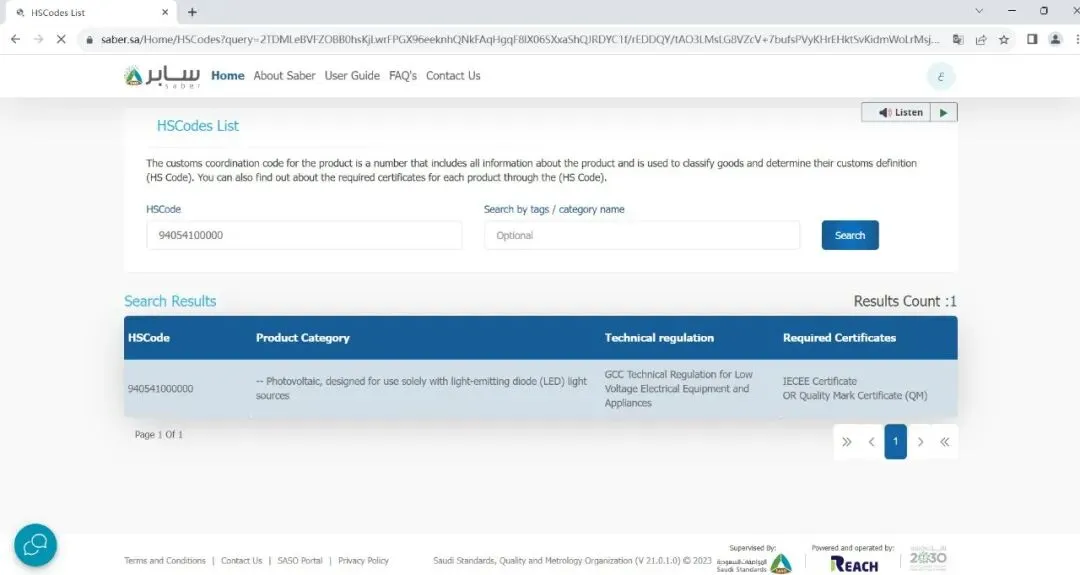
How to get for Saudi SABER Certification?
The Saudi Arabian Ministry of Industry and Commerce and the SABER system require that all products listed under SABER certification standards must have a valid saber certificate when entering Saudi customs.
Products without a SABER Certificate will be denied entry at Saudi ports.
According to the latest announcement by the Saudi Standards, Metrology and Quality Organization (SASO), starting January 1, 2025, all shipments to Saudi Arabia must obtain a Product Certificate of Conformity (PCoC)and a Shipment Certificate of Conformity (SCoC)through the SABER system to ensure quality and safety.
This new regULation mandates that all exporters apply through the SABER system to guarantee product compliance, improve import quality, and regulate Saudi Arabia’s market more effectively.

What Is SABER Certification?
SABER Certification is an online platform launched by SASO for product registration and issuance of Certificates of Conformity (CoC).
Essentially, SABER is an online system for managing product registration, certificate issuance, and shipment conformity clearance (SC Certificates)in a fully paperless process.
The SABER Conformity Assessment Program integrates regulations, technical requirements, and control measures into one unified framework aimed at ensuring both domestic and imported products meet Saudi safety and quality standards.
Types of SABER Certificates
SABER certification includes two main certificates:
1. Product Certificate of Conformity (PCoC)
- Used for product registration.
- Requires a valid product test report(and sometimes a factory audit).
- The certificate is valid for one year.
2. Shipment Certificate of Conformity (SCoC)
- RequiRED for each shipment before export.
- Based on the existing PCoC.
- Product details on the SCoC must match the PCoC information exactly.
Products Regulated Under SABER
SABER certification covers a wide range of regulated products, including but not limited to:
- Air conditioners, refrigeration, and heating equipment
- Batteries
- Cosmetics
- Toys
- Compressors and fans
- Household electrical appliances
- Pressure cookers
- Electrical cables and wires
- Fax machines
- Switches and circuit breakers
- Lighting and lamps
- Elevators and lifting systems
- Engines
- Office electronics
- Personal computers
- Power supplies
- Telephones
- Motor vehicles and spare parts
- Building materials and coatings
- Textiles, footwear, and related goods
SABER Certification Categories
All products entering Saudi Arabia are divided into three risk levels: high, medium, and low.
Each category determines the applicable certification process.
To determine the correct category:
1. Provide the product nameand Saudi customs (HS) code.
2. Check requirements using the [official SABER website](https://saber.sa/).
3. Certification authorities will recommend the appropriate conformity scheme.
Five Major Certification Schemes
Category 1: Supplier Conformity Declaration (Non-Regulated Products)
- Submit a Supplier Declaration of Conformity.
- Apply for the SCoConly (no PCoC required).
Category 2: COC or QM Certificate (General Regulated Products)
- Product sample testing by a CANS-accredited laboratory.
- Factory audit recommended (ISO 9001 certification helps but is not mandatory).
- Apply for both PCoCand SCoCthrough SABER.
Category 3: iecee certificate (IECEE-Regulated Products)
- Requires cb test report and cb certificatefrom a recognized CB lab.
- Apply for Energy Efficiency (EE)or EE exemption.
- Obtain iecee certification, then apply for SABER (PCoC + SCoC).
Category 4: GCTS Certificate (GCC-Regulated Products)
- Conduct product testing with a CANS-accredited laboratory.
- Obtain gcc certification first.
- Then apply for SABER (PCoC + SCoC).
Category 5: QM Certificate (GCC + QM-Regulated Products)
- Product testing in a CANS-accredited lab.
- Factory inspection by Saudi authorities.
- Apply for SABER (PCoC + SCoC).
SABER Certification Processing Time
The SABER certification process usually takes 5–7 working days.
If product testing or additional verification is required, the timeline may be extended.
Approximate Processing Times:
- Product Certificate (PCoC): 3 working days
- Shipment Certificate (SCoC): 2 working days
- CB test and report: 2–3 weeks
- gcc certification: 3–4 weeks
Application Process for SABER Certification
Step 1: Apply for the Product Certificate (PCoC)
1. The importerregisters an account on the SABER system.
2. The importer enters all product and application details.
3. The importer selects a certification bodywithin SABER.
4. Pay the PCoC application fee.
5. The certification body contacts the exporterto provide required documentation.
6. The certification body reviews and submits approved files to the SABER platform.
7. The PCoC certificateis issued (valid for one year).
Step 2: Apply for the Shipment Certificate (SCoC)
1. The importersubmits an SCoC application in SABER.
2. The certification body checks the validity of the PCoC.
3. Pay the SCoC application fee.
4. The SCoC certificateis issued for that specific shipment.
The SABER certification process is relatively straightforward — register, submit the required documents, and pay the relevant fees.
However, depending on product classification and certification path, both the timeand costcan vary significantly.
To save time and ensure full compliance, it is highly recommended to work with a professional SABER certification agencyexperienced in Saudi compliance procedures.
Email:hello@jjrlab.com
Write your message here and send it to us
 How Do You Get a CE Mark
How Do You Get a CE Mark
 IEC 60529 IP Rating Ingress Protection Standard
IEC 60529 IP Rating Ingress Protection Standard
 IEC 60601-1 Medical Electrical Equipment Basic Saf
IEC 60601-1 Medical Electrical Equipment Basic Saf
 European Authorized Representative Medical Devices
European Authorized Representative Medical Devices
 EU Waste Electrical and Electronic Equipment Direc
EU Waste Electrical and Electronic Equipment Direc
 How to Get CE Approval
How to Get CE Approval
 Accelerated Ageing Test
Accelerated Ageing Test
 IP Ingress Protection Testing
IP Ingress Protection Testing
Leave us a message
24-hour online customer service at any time to respond, so that you worry!




